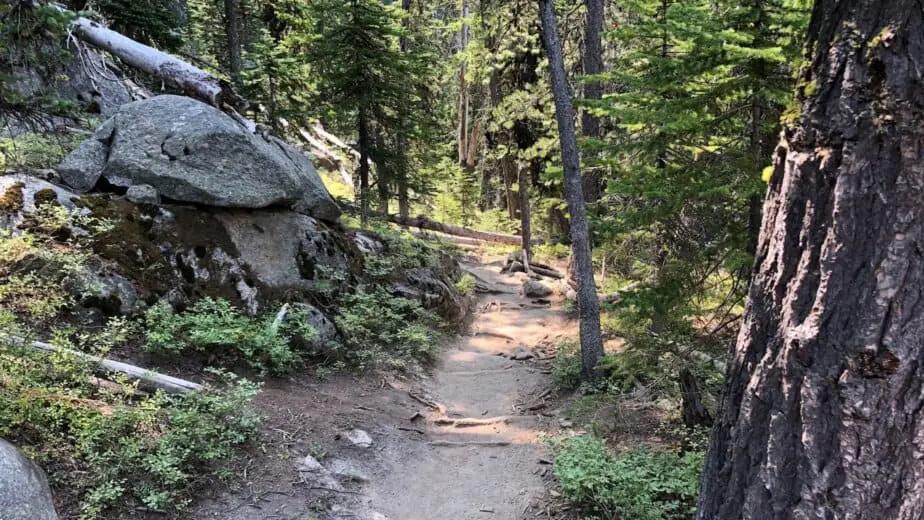Spending time outdoors is an opportunity to relish. Whether you are camping, fishing, or hitting the trails, you can feel a sense of peace and a deeper connection with yourself whenever you are in nature. In particular, hiking is a great way to see the vastness of nature’s beauty and enjoy a little exercise while you’re at it. But, have you ever wondered how beneficial hiking is to your overall physical and mental health and how it can change your body?
Hiking has proven to boost significant vital signs and provide measurable improvements in stress, anxiety, and attention levels. The physical demands of a good hike also work the vast majority of the body’s muscles, leading to increased endurance and comprehensive strength for the consistent hiker.
So, what is it about hiking that makes it such a healthy endeavor for the body, mind, and spirit? Read on to find out!
How Does Hiking Change the Body?
If you want to get in tremendous physical and mental shape without engaging in intensive training for a marathon or Ironman race, there is nothing better than frequent hiking. Science provides consistent and comprehensive data that your entire body benefits from the repetition of the irregular physical rhythms that a good hike can provide.
Hiking has been demonstrated to positively affect heart diseases, diabetes, bone density, core strength building, and balance, among other things. Through hiking, a person’s core vitals will improve, and the mental and emotional stimulation of the hike will produce a tangible sense of feeling strong and healthy.
Let’s break down some of the specific ways hiking can positively change the body.
Stronger and Happier Heart
Across the board, vitals
-
Weight
A daily hike provides the means to reduce a person’s weight and, as such, the strain on their heart.
-
Body fat percentage
A person’s total fat percentage will decrease over time as their muscles strengthen and their body begins to burn a higher percentage of fat—more on this later.
-
Body Mass Index (BMI)
This measure, which provides a more detailed look at the level of obesity (or lack thereof) of a person also declines significantly. It correlates strongly with both the decrease in weight and body fat percentage, as well as the increased muscle mass.
-
Resting heart rate
This measures a person’s heart rate when they are NOT engaging in any physical labor. Typically, the higher the resting heart rate, the harder a heart has to work (although a resting rate that is too low is bad for several reasons).
- Studies
show that hiking can reduce a person’s resting heart rate over time to a level considered healthy for elite athletes, which approximately equals 40 to 60 beats per minute. A lower (but safe) resting heart rate allows an individual to exert more strain and stress on their heart during strenuous physical activity.
- Studies
Gain Control Over Diabetes
Hemoglobin A1c is essentially an oxygen-carrying protein living within a red blood cell and chemically bound to one or more sugar molecules. When a physician runs blood work on you during a physical evaluation, an A1c test is part of the workup. The more proteins in your red blood cells saturated with sugar, the higher your A1c count will be. This count is a reliable indicator not only of the presence of diabetes but also of the risk of diabetes complications.
In this study
It should be noted that the A1c count can be influenced by other factors as well, especially one’s diet. But, regular hiking, combined with healthy eating practices, has proven
Better and More Efficient Calorie Burning
Hiking is a great way to burn calories. However, the same study
Without delving into the complexities, our bodies tend to burn fat at a lower intensity, and then increase to greater carbohydrate burning at a high intensity (i.e., higher heart rates). Carbs are a great energy source but are relatively inefficient compared to fats. In other words, we have to ingest a far more significant amount of carbs to provide the same amount of energy contained within a lower quantity of fats.
At the end of this study
This increased efficiency also contributes to the reduction of the effects of diabetes thanks to hiking. While carbohydrates are necessary for the body, an overabundance of them contributes to higher blood sugar and potential diabetes if not managed properly. The body’s increased ability to process the denser fats into energy from regular hiking leads to a diet far less dependent on less efficient carbs.
Enhanced Muscle Strength
Hiking is a tremendous way to acquire strength in the core muscles of your body. These muscles—which include the abs, glutes, obliques, hips, and lower back—are the ones that help drive and organize the body into fluid and controlled motions thanks to the random variation of hill work involved while hiking.
Like a Stairmaster at a gym, hiking builds core muscles through a process
But, core muscles are by no means the only ones that hiking benefits. Indeed, as mentioned earlier, upper and lower leg muscles are strengthened simply by moving but also by uneven and hilly terrains. This is notable compared to cyclists and runners, who often wind up building stronger upper leg muscles but usually don’t notice much impact on their lower legs and glutes.
Additionally, hiking sticks are great not only for balance but also for encouraging a greater use of your arm muscles on challenging terrains. Indeed, even pectorals are used to stay upright while carrying a backpack or when any climbing or bouldering may be done.
Greater Stability and Balance
It comes as no surprise that, with the strengthening of these core muscles, regular hiking can also give you greater stability and balance. But there is an added bonus to this newfound balance.
One of the greatest risks for injury, particularly for seniors, is falling. Falls can lead to broken bones, but an equally dangerous risk—even if the person doesn’t actually fall—is the overcompensation caused by alternating muscle groups. In other words, if a person is about to fall or stumble, their body has an involuntary reaction involving a different set of muscles attempting to prevent an injury.
For example, an individual who is falling might try to brace their fall with their arms, reach out to grab something, or twist and turn their back to stay upright. Ironically, these attempts can cause severe damages not only to more bones, which may suffer the force of the impact, but also to potentially underused muscles that may pull, strain, or even tear when under significant duress.
The effects of core building from hiking are that falls may be reduced due to increased strength and balance. However, in the event of a fall or collision, the muscles that may involuntarily react have become “practiced” enough for the sudden use of them to likely help you rather than cause more harm.
Redevelopment of Bone Density
A research
Physical exercise is the most effective way to enhance one’s bone density naturally. As hiking offers a diverse and wide-ranging workout for the entire body, its effects also carry over to the bones in your legs and back. The strengthening of muscles in this area increases bone strength, and the entire muscular-skeletal system engages in the movement on uneven terrains.
Greater Stimulation of the Brain
In addition to reducing stress and anxiety, evidence
-
Problem-solving skills
The combined effects of disconnection from technology during an outdoor activity and the aforementioned holistic physical benefits of hiking have been shown to increase stimulation in the brain’s frontal lobe. This area of the brain is primarily responsible for problem-solving skills. According to this research article
, participants in one study, who were asked to backpack for four consecutive days, were found to experience nearly a 50% increase in their ability to perform tasks that required critical thinking.
-
Reduction of ADHD symptoms
The American Journal of Lifestyle Medicine published an article
which demonstrated that adolescents diagnosed with ADHD benefited greatly from regular exposure to the outdoors. The expression of their ADHD symptoms improved, as well as their ability to focus and pay attention to the task at hand. These benefits increased significantly when the students were asked to go on regular hikes.
What Happens to Your Body After a Long Hike?
While the emphasis of this article is on the long-term effects of regular hiking, noticeable physiological changes can happen even after one strenuous hike:
-
Burn a significant amount of calories
Even a moderate 1-hour hike can burn approximately 400 calories. This figure does not account for carrying a backpack, elevation change, or one’s pace. A longer and more challenging hike will obviously burn even more calories.
-
Lower stress levels
A study by Landscape and Urban Planning reports that people who spend 50 minutes a day walking in nature experience less stress than those who spend time walking or exercising near the sound of traffic. With its relative isolation, hiking is excellent for mental relaxation.
-
Reduce feelings of worry and anxiety
A study about stress conducted by the Proceedings of the National Academy of Sciences shows that a 90-minute walk in nature reduces the amount of time a person spends worrying. Specifically, the sensory stimulation provided by the hike helps shift focus to the present moment and away from negative and self-demeaning thoughts.
-
Enhance mood and energy
In addition to lowering stress, hiking stimulates the release of adrenaline and endorphins. Adrenaline not only helps relieve tension but also contributes to more energy. Meanwhile, endorphins are chemicals released by your body in moments of stress, and especially during prolonged periods of physical activity. Their effect mimics those of opioids in terms of providing a natural mood enhancer that leaves you happier after an activity like hiking.
Final Thoughts
You can make a rough comparison between hiking’s benefits and those you would receive when working out at the gym. The long-lasting nature of a hike gives you the cardio work of a treadmill or stationary bike. Meanwhile, the hill work exercises the entirety of your leg muscles, as you would experience on an elliptical or stair machine. Even carrying a heavy backpack on your hike equals the weight work and core muscle exercises you can do in the gym.
But, in addition to lumping all of these separate gym workouts into one activity, hiking provides a much more relaxed environment for physical exertion—the outdoors—than the confined spaces of a gym.
So, if you’ve ever wondered if hiking was worth the time and investment of getting deep into nature, we hope this overview has answered that question with a resounding yes! Hiking can change your body and mindset for the better. So, invite a friend, talk it up with strangers, and be a champion for hiking!

